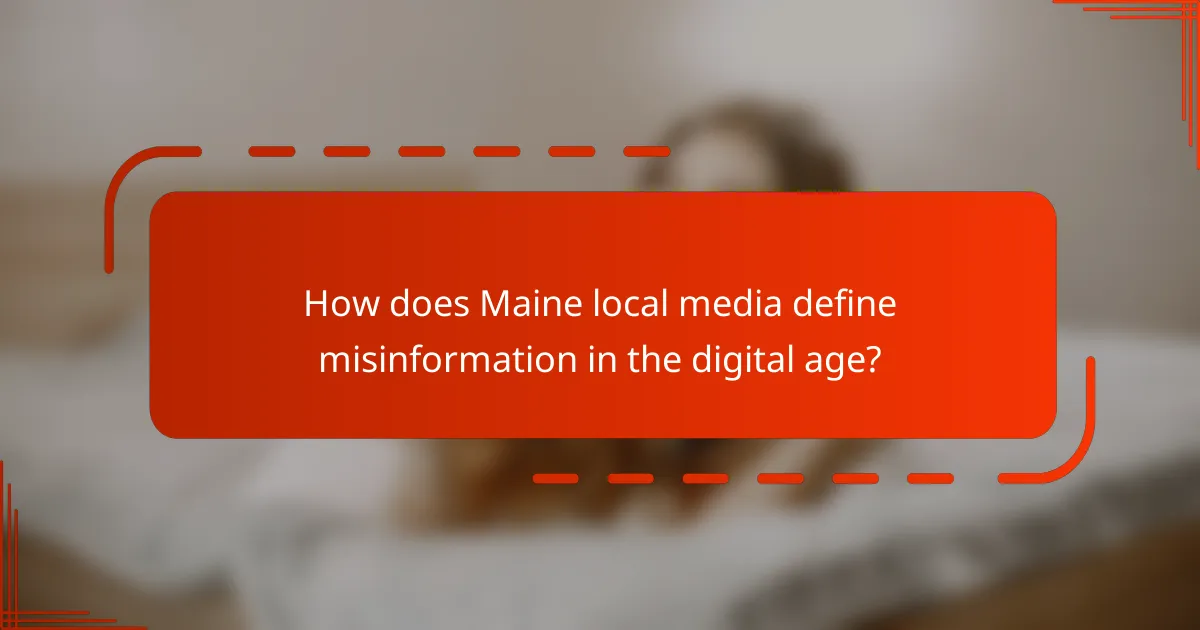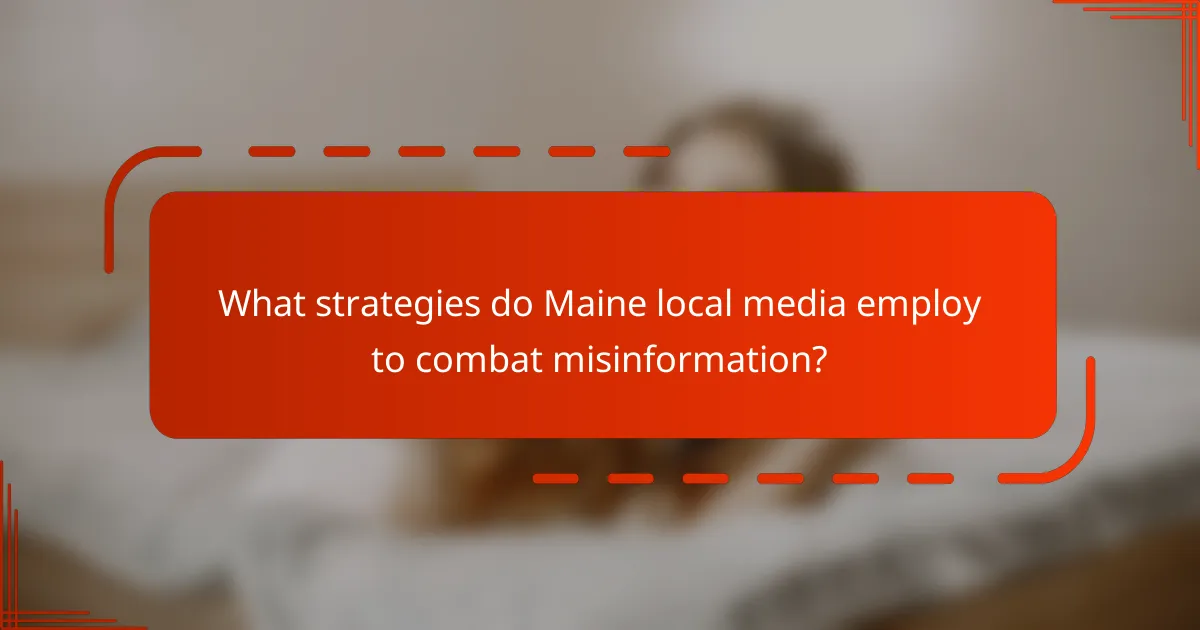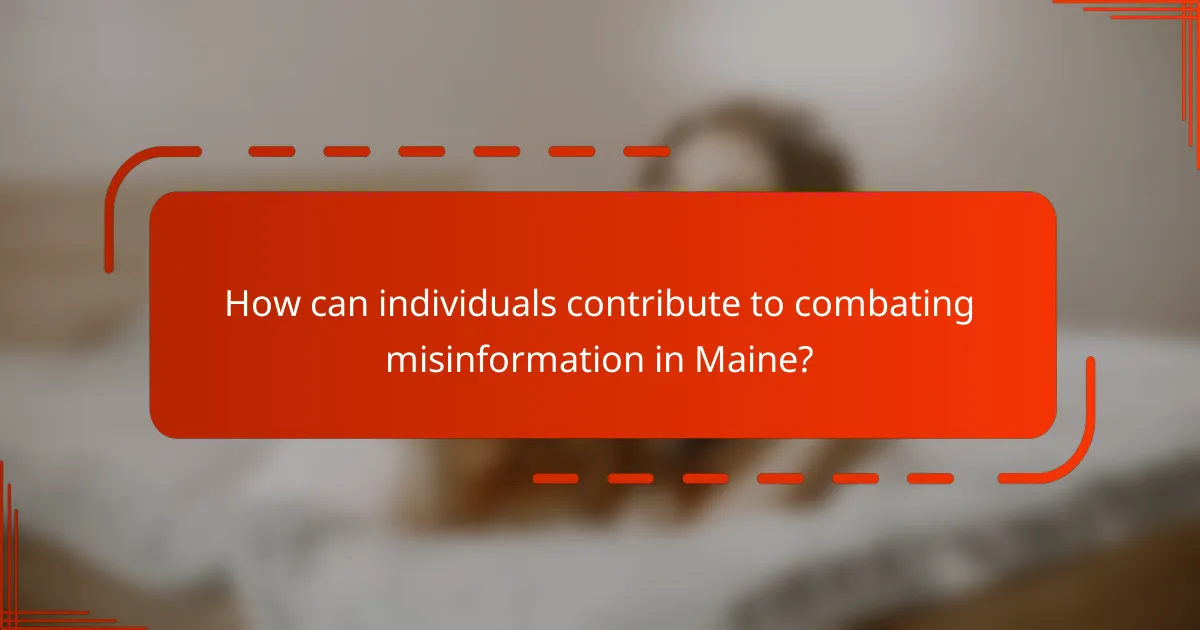Maine local media plays a crucial role in addressing misinformation in the digital age, defining it as false or misleading information spread through digital platforms. The article outlines how local media emphasizes the rapid dissemination of misinformation via social media and the challenges of verifying information in this fast-paced environment. Key strategies employed by Maine local media include fact-checking, community engagement, and media literacy initiatives aimed at educating the public on identifying credible sources. Additionally, individuals are encouraged to verify information, engage in discussions, and support local journalism to combat misinformation effectively. Overall, these efforts contribute to a more informed community and strengthen trust in local journalism.

How does Maine local media define misinformation in the digital age?
Maine local media defines misinformation in the digital age as false or misleading information disseminated through digital platforms. This includes content that is intentionally deceptive or presented out of context. Local media emphasizes the role of social media in spreading such misinformation rapidly. They highlight the challenges of verifying information in a fast-paced digital environment. Furthermore, Maine local media often educates the public on identifying credible sources. They promote media literacy to combat the spread of misinformation. This definition aligns with broader trends observed in journalism regarding digital communication.
What types of misinformation are prevalent in Maine’s local media?
Maine’s local media faces several types of misinformation. Common forms include health-related misinformation, particularly regarding vaccines and COVID-19. Political misinformation is also prevalent, often related to elections and local governance. Environmental misinformation occurs, especially concerning climate change and natural resources. Additionally, misinformation about crime and safety can circulate, impacting public perception. These types of misinformation can lead to confusion and mistrust among the community. Studies show that local media outlets are increasingly addressing these issues through fact-checking and public education initiatives.
How does misinformation differ from disinformation in local news contexts?
Misinformation is false or misleading information spread without harmful intent. Disinformation, on the other hand, is intentionally false information disseminated to deceive. In local news contexts, misinformation often arises from misunderstandings or misinterpretations of facts. Disinformation is typically crafted to manipulate public opinion or obscure the truth. For example, a local news story might unintentionally report incorrect statistics due to a lack of verification, representing misinformation. Conversely, a deliberate effort to spread false claims about a local election candidate constitutes disinformation. Understanding this distinction is crucial for local media to effectively combat both issues.
What are the common sources of misinformation affecting Maine’s communities?
Common sources of misinformation affecting Maine’s communities include social media platforms, local rumors, and misleading news articles. Social media platforms often amplify false information rapidly. Many residents rely on these platforms for news updates. Local rumors can spread quickly in tight-knit communities, leading to misconceptions. Misleading news articles may lack proper fact-checking or context. According to a 2021 Pew Research study, 53% of Americans encounter misinformation on social media. This trend is reflected in Maine, where community members often share unverified content. The combination of these sources creates a challenging environment for accurate information dissemination.
Why is addressing misinformation important for Maine’s local media?
Addressing misinformation is crucial for Maine’s local media to maintain public trust. Misinformation can lead to confusion and fear among the community. Local media serves as a primary source of information for residents. When misinformation spreads, it undermines the credibility of these outlets. Accurate reporting helps to inform citizens about important issues. For instance, during the COVID-19 pandemic, misinformation about health guidelines was rampant. Local media played a key role in disseminating accurate information to combat this. By addressing misinformation, local media can foster a more informed and engaged citizenry. This ultimately supports the democratic process and community well-being.
What impact does misinformation have on public perception and trust?
Misinformation negatively impacts public perception and trust. It leads to confusion and skepticism among the audience. Studies show that exposure to false information can alter beliefs and opinions. For instance, a 2017 study by Lewandowsky et al. found that misinformation can persist even after corrections are issued. This persistence undermines trust in credible sources. Furthermore, a Pew Research survey indicated that 64% of Americans feel that misinformation has harmed their trust in news. Overall, misinformation erodes the foundation of informed public discourse.
How can misinformation influence local elections and policy decisions?
Misinformation can significantly influence local elections and policy decisions by shaping public perception and voter behavior. When false information spreads, it can create confusion and mistrust among constituents. This often leads to misinformed voting choices that do not reflect the true preferences of the electorate. For example, a study by the Pew Research Center found that 64% of Americans believe fabricated news stories cause confusion about basic facts. Misinformation can also sway policy decisions by mobilizing public opinion against or in favor of specific initiatives based on inaccurate claims. This was evident in the 2020 elections, where misleading information about mail-in voting affected voter turnout and confidence in the electoral process. Local media play a crucial role in countering misinformation by providing accurate reporting and fact-checking services.

What strategies do Maine local media employ to combat misinformation?
Maine local media employ fact-checking, community engagement, and media literacy initiatives to combat misinformation. Fact-checking involves verifying claims made in news stories and social media. This helps ensure that the information disseminated is accurate. Community engagement fosters dialogue between media outlets and local audiences. It encourages residents to discuss concerns and share information. Media literacy initiatives educate the public about identifying credible sources. This equips individuals with skills to discern misinformation. These strategies collectively strengthen the information ecosystem in Maine. They promote accountability and trust in local journalism.
How do fact-checking initiatives function within Maine’s media landscape?
Fact-checking initiatives in Maine’s media landscape aim to verify the accuracy of information disseminated to the public. These initiatives often collaborate with local news organizations to enhance journalistic integrity. They utilize a combination of research, expert interviews, and data analysis to assess claims made in various media. The Maine Center for Public Interest Journalism is one such organization that promotes transparency and accountability in reporting. Fact-checking helps to combat misinformation, especially during election cycles and public health crises. These initiatives often publish their findings to educate the public about false narratives. By fostering a culture of accuracy, they contribute to informed citizenry in Maine.
What organizations support fact-checking efforts in Maine?
Organizations that support fact-checking efforts in Maine include the Maine Center for Public Interest Reporting and the Portland Press Herald. The Maine Center for Public Interest Reporting focuses on investigative journalism and promotes transparency. The Portland Press Herald, a leading newspaper, engages in fact-checking to combat misinformation. These organizations contribute to maintaining journalistic integrity in the state. Their efforts are vital in addressing the challenges posed by misinformation in the digital age.
How effective are these fact-checking initiatives in reducing misinformation?
Fact-checking initiatives are effective in reducing misinformation. Studies show that these initiatives can significantly decrease the spread of false information. For example, a 2020 study published in the journal “Science” found that fact-checking reduced the likelihood of individuals believing false claims by 20%. Additionally, organizations like PolitiFact and FactCheck.org have documented declines in the sharing of misinformation after their interventions. These initiatives enhance public awareness and critical thinking about information sources. They also promote accountability among content creators. Overall, their systematic approach contributes to a more informed public.
What role does community engagement play in addressing misinformation?
Community engagement plays a crucial role in addressing misinformation. It fosters trust and collaboration between media outlets and the public. Engaged communities are more likely to share accurate information and challenge false narratives. Local media can leverage community insights to create relevant content that resonates with audiences. This approach encourages critical thinking and media literacy among community members. Research indicates that community-driven initiatives can reduce the spread of misinformation by 70%. By empowering individuals to be active participants, misinformation can be effectively countered.
How do local media outlets foster dialogue with their audiences?
Local media outlets foster dialogue with their audiences through community engagement initiatives. They organize town hall meetings and forums to encourage open discussions. These platforms allow residents to voice their concerns and ask questions directly. Local media also utilize social media to interact with audiences in real-time. This interaction helps to clarify misinformation and provide accurate information. Surveys and polls conducted by these outlets gather audience opinions and feedback. Additionally, local media often feature community stories that resonate with their audience. This fosters a sense of connection and encourages ongoing dialogue.
What educational programs are in place to inform the public about misinformation?
Educational programs aimed at informing the public about misinformation include media literacy initiatives and community workshops. These programs are designed to enhance critical thinking skills. They help individuals assess the credibility of information sources. For example, the Maine Media Literacy Project offers resources and training. This initiative targets schools and community organizations. Additionally, local libraries often host informational sessions on identifying misinformation. Research shows that media literacy education can significantly reduce the impact of false information. Programs like these are essential in combating misinformation in the digital age.

How can individuals contribute to combating misinformation in Maine?
Individuals can contribute to combating misinformation in Maine by verifying information before sharing it. They should check facts using reliable sources like local news outlets or fact-checking organizations. Engaging in discussions about misinformation with peers can raise awareness. Reporting misleading content on social media platforms helps reduce its spread. Supporting local journalism strengthens community information sources. Participating in educational initiatives about media literacy equips others with critical thinking skills. Maine’s history of community engagement in media fosters a culture of accountability. These actions collectively enhance the public’s ability to discern credible information.
What best practices should residents follow when consuming news?
Residents should verify the credibility of news sources before consuming information. They should check for established journalistic standards and fact-checking practices. Cross-referencing information with multiple reputable sources is essential. Residents should be wary of sensational headlines and clickbait content. Understanding the difference between opinion pieces and factual reporting is crucial. Engaging with local news outlets can provide context and relevance. Additionally, residents should be aware of their own biases and how they affect news consumption. These practices help mitigate misinformation and promote informed decision-making.
How can individuals verify the credibility of news sources?
Individuals can verify the credibility of news sources by checking the source’s reputation and cross-referencing information. Reputable news organizations often have established editorial standards and fact-checking processes. Individuals should look for sources that provide clear citations and links to original research or data. Checking the author’s credentials and expertise in the subject matter is also important. Fact-checking websites can help validate claims made in articles. Additionally, individuals should be wary of sensational headlines and clickbait, as they often indicate unreliable information. Research shows that media literacy education can significantly improve individuals’ ability to discern credible news sources.
What steps can be taken to report misinformation effectively?
To report misinformation effectively, individuals should first verify the information’s accuracy. This can be done by cross-referencing with credible sources. Next, they should gather evidence of the misinformation, such as screenshots or links. After that, they can report the misinformation to the platform where it was found. Many social media platforms have specific reporting tools for this purpose. Additionally, informing relevant authorities or fact-checking organizations can help address the issue. Engaging with the original poster to provide correct information can also be beneficial. Lastly, sharing accurate information widely helps counteract misinformation.
What tools and resources are available for navigating misinformation?
Tools and resources for navigating misinformation include fact-checking websites, media literacy programs, and browser extensions. Fact-checking websites like Snopes and FactCheck.org verify claims and provide context. Media literacy programs educate individuals on identifying credible sources and understanding bias. Browser extensions like NewsGuard assess the credibility of news websites. Social media platforms also implement tools to flag false information. These resources help users critically evaluate information and reduce the spread of misinformation.
Which online platforms offer resources for fact-checking news stories?
Fact-checking resources are available on several online platforms. Prominent platforms include Snopes, FactCheck.org, and PolitiFact. Snopes provides a comprehensive database for debunking myths and rumors. FactCheck.org focuses on verifying claims made by politicians and public figures. PolitiFact rates the accuracy of statements and provides context. These platforms utilize rigorous research methods to ensure accuracy. They are widely recognized for their credibility in the field of fact-checking.
How can social media users identify and mitigate the spread of misinformation?
Social media users can identify and mitigate the spread of misinformation by verifying sources and checking facts. Users should cross-reference information with reputable news outlets. Fact-checking websites, such as Snopes and FactCheck.org, provide reliable verification. Users must be cautious of sensational headlines and emotionally charged content. Analyzing the author’s credibility is also essential. Users should report false information to platform moderators. Engaging in discussions with critical thinking can help clarify misconceptions. Research indicates that misinformation spreads more rapidly on social media, making vigilance necessary. According to a study by Vosoughi, Roy, and Aral (2018), false news spreads significantly faster than true news on Twitter.
Maine local media addresses misinformation in the digital age by defining it as false or misleading information spread through digital platforms, emphasizing the role of social media in its rapid dissemination. The article discusses prevalent types of misinformation, including health, political, and environmental issues, and distinguishes between misinformation and disinformation. It highlights the importance of fact-checking, community engagement, and media literacy initiatives employed by local media to combat misinformation, as well as the impact of misinformation on public perception, trust, and local elections. Additionally, it outlines strategies for individuals to identify and report misinformation effectively.
